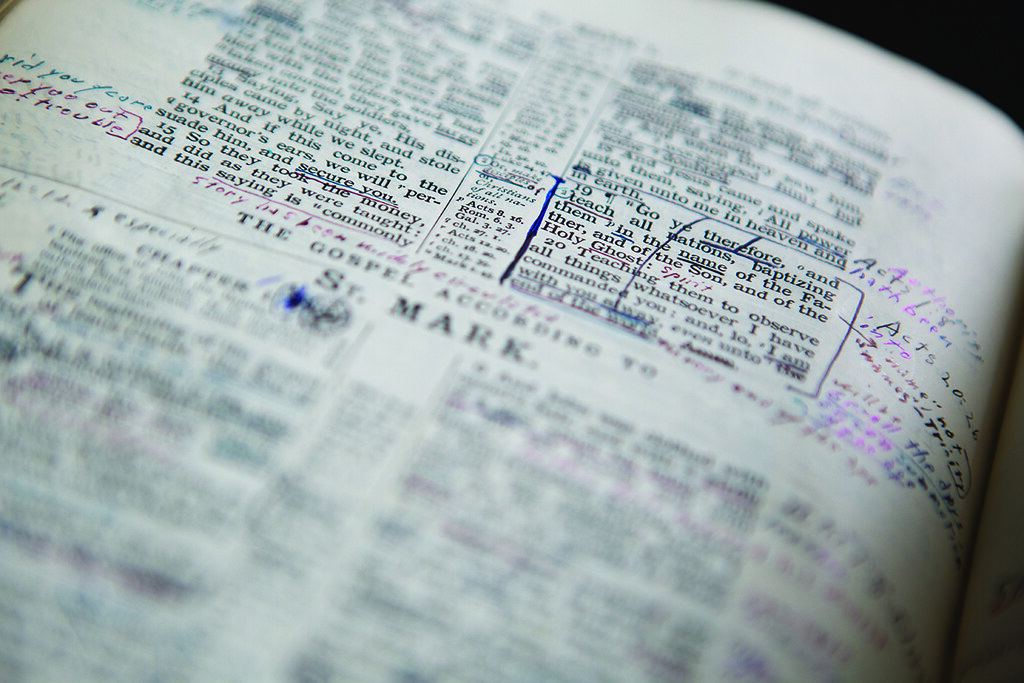Archives and the Church
Jonathan Lawler | April 05, 2019

What are archives?
“Archive” is a word we see each and every day. Our email accounts include a folder entitled “Archive,” and our Facebook pages “archive” old information, reminding us through the “Memories” feature of past events, photographs, etc. Such use of the word reinforces the notion that we set aside things we no longer need in an “archive.” So what exactly are archives and what use are they?
Archival repositories preserve unique material, including personal paper collections that may contain correspondence, photographs, drafts of written works, etc. Archives also collect records relating to institutions, so the Archives and Special Collections at SEBTS collects records relating to the operations of the seminary. Special Collections consisting of rare books are often held by archives as well.
Modern archival practice continues a long tradition of document preservation. The Old Testament includes various references to the preservation and use of both inspired texts (Deuteronomy 31:24-26, 2 Kings 22:8) and uninspired writings (Numbers 21:14, Joshua 10:13, 2 Samuel 1:18). The CSB notes in Ezra 6:1 that King Darius ordered a search of the “archives” to discover the decree allowing construction of the Temple.
The Bible speaks to the value of these preserved records. The end of Deuteronomy notes, “When Moses had finished writing down on a scroll every single word of this law, he commanded the Levites who carried the ark of the Lord’s covenant, ‘Take this book of the law and place it beside the ark of the covenant of the Lord your God so that it may remain there as a witness against you [emphasis added]’” (Deuteronomy 31:24-26, CSB). While not God-breathed as the Book of the Law, uninspired archival material can also act as a witness to the Lord’s character, the truth of Scripture and the perseverance of the saints. Through the Spirit’s work, archival material can lead to reform like that seen during the reign of Josiah in 2 Kings 22. Moses’ actions preserved the Book of the Law, which was likely discovered by the high priest Hilkiah in Josiah’s era, leading to a God-honoring reformation. Archives preserve material to serve as a witness to future generations, including future generations of believers seeking to fulfill the Great Commission.
Why are archives important for the Church?
For archives to serve as witness requires use. Thus, archives not only preserve material, but they also make it accessible to users.
How many seminary students desire to emulate Charles Spurgeon in the pulpit? Spurgeon’s skill in preaching God’s word is highly regarded in the evangelical world. All the Spurgeon sermons enjoyed by believers today are published from originals stored in archives. But not only material by internationally recognized names like Spurgeon serve to encourage the Church today. Sermons and other writings by lesser-known saints who have gone before can edify the Church today as well. Southeastern’s archives hold the writings of well-known evangelicals like Francis Schaeffer and John Warwick Montgomery, but also lesser-known, though influential, believers like pastor M. O. Owens. This material can edify those seeking various types of ministry from apologetics to pastoral ministry to missions.
You might ask, what do archives have to say to the GO seminary? Well, those who went before us challenge the church that is going today. For example, M. O. Owens, for whom a Chair in New Testament Studies at SEBTS was installed in 2012, preached a sermon in 1958 entitled, “Go … Make Disciples.” Sermons like this edify the church today and instruct those seeking the responsibility of preaching God’s word. In this sermon Owens wrote, “Most of us have professed to be disciples. But let me ask you? How important is the Kingdom of God to you? Really? The word [go] was spoken to you and me. What are you actually doing about it?” This was convicting in 1958; this is convicting in 2019. Archives do not contain “dead” documents; they hold life-giving words that edify, encourage and equip the saints to GO!
Conclusion
Archives build up the Church by preserving and making accessible the witness of the saints of old. The lyrics of a hymn written by Keith and Kristyn Getty, who wrote Southeastern’s own hymn, come to mind. In “O Church Arise” the Gettys wrote:
So Spirit, come, put strength in every stride;
Give grace for every hurdle.
That we may run with faith to win the prize
Of a servant good and faithful.
As saints of old, still line the way,
Retelling triumphs of His grace,
We hear their calls, and hunger for the day
When with Christ we stand in Glory.
Archives retell the triumphs of God’s grace in the lives of believers who came before us. Armed with such stories and examples we emulate their faithfulness and learn from their mistakes as we “run with faith to win the prize.”
The powerful testimonies of the saints of old and their preserved stories of “triumphs of His grace” propel others to “Go … make disciples” and bring glory to our God.
